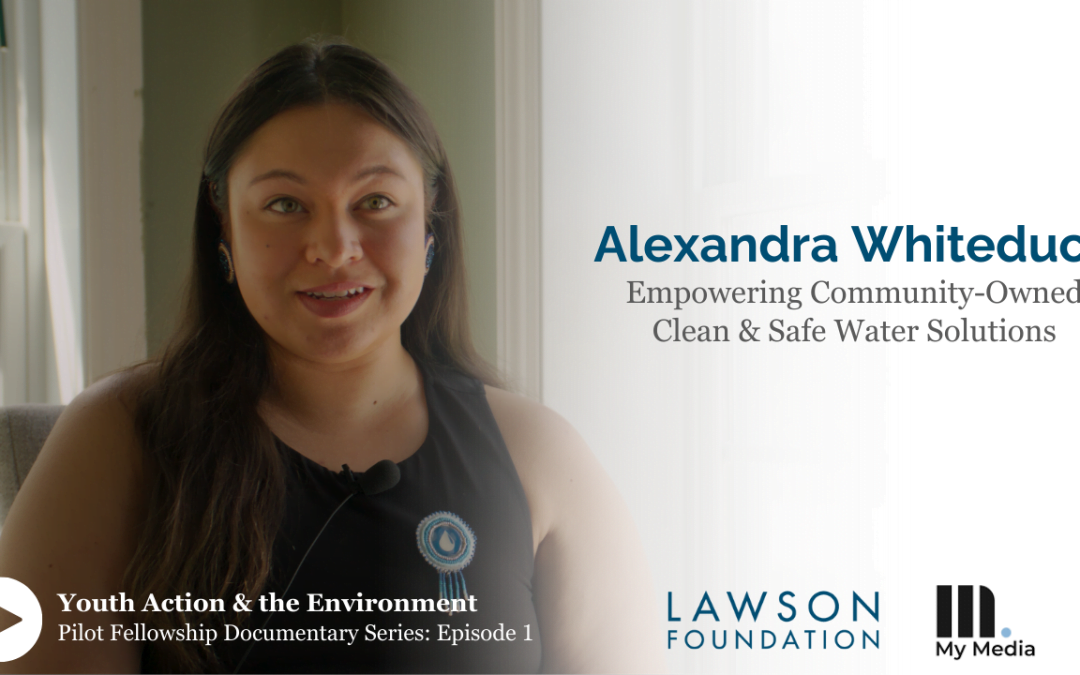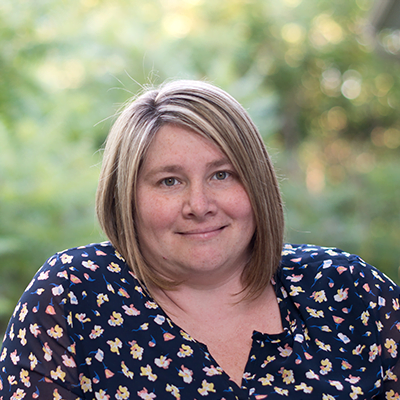This film is episode one of our Youth Action & the Environment Pilot Fellowship documentary series, produced by My Media Creative as part of their Climate Warriors Series. Each film captures the incredible stories of four fellowship recipients, the projects they’ve championed, and how they have grown as environmental leaders.
Alexandra’s Youth Action & the Environment Pilot Fellowship Story
Alexandra’s journey reflects an inspiring story of transforming unimaginable hardship – growing up without safe and clean drinking water – into a powerful driving force for action. Drawing on her childhood experiences in Kitigan Zibi Anishinabeg, Alexandra has directed her energy toward amplifying young Indigenous voices and empowering community-owned solutions for safe and clean drinking water in First Nations communities. In university, she founded Project Nibi, a student-led social enterprise that is actively working toward these goals.
Yet, to succeed in her work, Alexandra had to contend with the all too familiar balancing act that many young environmental leaders face: juggling education with full-time work while still finding the drive, time, and critical resources to create impactful change.
Whether you are a funder, youth leader, or inspired onlooker, there is much that we can all learn and take away from her inspiring story, leadership journey, and passion for a better future.
The Importance of Supporting Youth Environmental Leadership
In 2022, Alexandra became one of the four first recipients of the Lawson Foundation’s Youth Action & Environment Pilot Fellowship. She gained access to a year of comprehensive support, including financial aid, coaching, mentorship, and collaborative opportunities to help her project and leadership development grow.
“Lawson Foundation helped me in taking a step back and delegating tasks better. Instead of having to do everything for the project, I started building a team that was there to support me and the project. We had leadership workshops and the help of a business mentor, Jonathan Wade, who really helped me see myself as a leader and orient my project in the direction that I wanted it to go.”
“I refocused on trying to create solutions, realizing that I was spreading myself too thin with too many projects, and so the fellowship helped me understand that if you want to get a project done properly, you need to focus on that project.”
Inspiring the All-Important First Steps
Canada’s youth movement for environmental action suffers from high burnout and a critical lack of resources. Yet, their innovative ideas often present unique and creative solutions with significant impact potential if effectively nurtured. Alexandra’s fellowship experience highlights the clear importance of empowering young leaders to help them succeed.
“Sometimes in this field, it feels like we are doing work that has absolutely no results, so to have others confirm that the work we are doing is good, and inspiring, and is creating change is honestly what keeps most of us going down the path of environmental stewardship.”
Importantly, when young environmental leaders succeed, they inspire others to believe they can influence positive change. This was an experience that Alexandra especially took away through her opportunities to meet and regularly connect with the other fellowship recipients.
“Meeting the other fellows and seeing that there are other young people out there who are standing up to create change was very inspiring to me.”
In today’s globally connected world, young people are more aware than ever of the problems that exist, leading both to the rise of new leaders who want to create change but also an existential crisis among those who feel that they can only do so much as an individual.
“You might think that it’s such a big problem to tackle, but often all it takes is that first step, and if you take that first step, there are going to be others that feel the same way and are going to want to take that first step with you. If you keep it internalized, nothing is going to change.”
Managing the Realities of Confronting Systemic Injustices
“There are 634 First Nation communities in Canada, and a large majority of these communities do not have access to clean drinking water.”
The scale of the problem that Alexandra is trying to solve is immense and steeped in decades of government failure or inaction. Yet, despite the shocking reality of what is happening, many people, including those in positions of power, either don’t know or don’t act.
“I still speak to government representatives who are shocked when I tell them what is happening. That always catches me off guard. I grew up without access to clean drinking water, so I am very close to the issue, but for others to be so disconnected from what is happening around them is always surprising.”
“So every single time I meet with someone who is new to the issue, I have to do the same spiel about how long this has been going on, and then the same question is always asked, ‘Isn’t the government doing something about it,’ and I have to tell them ‘no.’”
Yet, as with many of the challenges Alexandra has faced on her journey, she transforms this hardship into fuel that propels her impact forward.
“If the government is doing nothing about helping my people, then I’m going to do something about it, and that’s why I run Project Nibi. Because at some point, we can only wait for so long until we have to take matters into our own hands and fix our own issues.”
The intersectional impacts of funding young environmental leaders
Through her initiative, passion, and leadership, Alexandra is already creating real change for communities on the ground. With access to new resources through the Lawson Foundation’s Fellowship, Alexandra and her Project Nibi team could travel out to Hopedale, Labrador, to help install three filtration systems in the school, community center, and health center.
Notably, the support and funding that Alexandra received had a cascading effect where, because of her ability to showcase the impact Nibi could have when necessary resources were provided, additional funders lined up to help her raise nearly $50,000 for the Hopedale project.
These are the exact outcomes that the Lawson Foundation was striving to achieve in creating the Youth Action and Environment Pilot Fellowship. Not only did Alexandra grow as a leader, but with additional funding in hand, she could scale her project’s impact, helping translate the Foundation’s support and trust in her work into further funding opportunities.
“I now have so much more confidence in the work that I do and in the direction that I’m going. At first, I was very unsure if this project was viable, so knowing there are people out there who want to see and support a solution like this has really helped me along this journey.”
Looking to the future, Alexandra emphasizes that more significant financial support and trust in the power of community-owned solutions are critical in overcoming the historical injustice of the ongoing lack of access to clean drinking water for many Indigenous peoples across Turtle Island.
“We are a nonprofit for a reason; all the funds we raise go directly to the infrastructure and projects we run. The first step to economic reconciliation is ensuring every First Nation community has access to clean drinking water. Without that infrastructure already in place, you can’t build homes, roads, and schools until you fix that issue first.”
You can learn more about Project Nibi here and connect with Alexandra on LinkedIn here. We encourage you to explore ways in which you can support her work.

